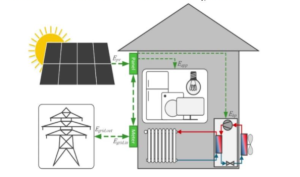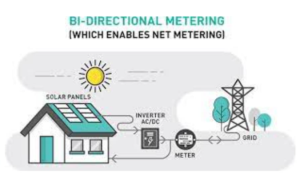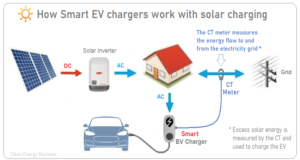Image: savetheworldeveryday.com
Written by Giannis Taousanidis, electrical engineer at Wattcrop.
During last year or so, peaking after the invasion in Ukraine, we can watch energy cost growing rapidly.
Some years before, there was a widespread belief that RES increased the cost of energy, especially electricity. The very reality of fossil fuels prices constantly changing, of course proved the advocates of that idea wrong.
The truth, of course, is one step beyond. RES are actually reducing the cost of not only electricity, but also energy used for heating and for transportation.
As for space heating, there is no cheaper solution, apart from district heating (use the heat produced in thermal plants during electricity production to heat water and then deliver it to consumers), which can accommodate only people living near thermal plants, than heat pumps.
 Heat pumps use electricity to produce space heating, but contrary to air-conditioning they use significantly less electricity during the day. Combining them with a rooftop PV system, can reduce the cost even further, as we know how much it will cost us for the entire life of the system (at least 25 years) and we do not have to deal with the electricity prices’ up and downs.
Heat pumps use electricity to produce space heating, but contrary to air-conditioning they use significantly less electricity during the day. Combining them with a rooftop PV system, can reduce the cost even further, as we know how much it will cost us for the entire life of the system (at least 25 years) and we do not have to deal with the electricity prices’ up and downs.
When it comes to water heating, solar water heaters are widely spread for a few decades now. In fact, if somebody wants to be selected for the building eneergy saving scheme “Exikonomo”, but also the new scheme “Rooftop PVs up to 6kW”, it is obligatory that they use RES for water heating (solar water heater is almost exlusively the choice for that). To put it into perspective, the use of a classic electric water heater is responsible for around 10% of annual electricity consumptioin.
 Regarding electricity consumption, the first solution that comes to mind is a rooftop PV with a net metering scheme.
Regarding electricity consumption, the first solution that comes to mind is a rooftop PV with a net metering scheme.
Net metering (offsetting the electricity absorbed by the distribution network against the electricity produced by the PV) is a scheme that can drastically reduce the electricity cost. Indicatively, a 6kW rooftop PV can produce the annual electricity needed by a Greek household, and considering its price nowadays (7-8k €), the payback period is less than 10 years, meaning that for the rest 15 years of PV’s lifespan the cost of electricity is zero. Moreover, the scheme “Rooftop PVs up to 6kW” allows the prosumer to sell the surplus of produced electricity to the grid, contrary to the other net-metering schemes in Greece.
As for enterprises, apart from the obvious choice of net-metering, there is the option to go for a PPA (Power Purchase Agreement) directly with a producer, meaning a predetermined (fixed or changing) price for a long-term period. When the electricity is produced from RES, this price can be lower, due to the fact that the “fuel” (wind, sun etc.) is supplied for free and we know all the costs of the project beforehand. The PPA tenor usually ranges from 5-15 years.
Of course, when it comes to small or medium-sized enterprises, this can be harder, but a sort of cooperative could help to negotiate for a better price with the producer. For instance, a trade association could negotiate with a producer for all small enterprises that formed it. The same can also be applied to municipalities.
Furthermore, an enterprise that enters a PPA with a RES producer complies with some of the ESG criteria boosting its credibility.
Finally, a substantial part of energy is consumed in transportation. We all have heard about EVs (electrical vehicles) or hydrogen vehicles. As for private cars, EVs are an option that may appears a bit expensive CAPEX-wise nowadays, especially when considering Greece’s financial situation, but greatly reduces every other cost needed during after. When it comes to bigger vehicles (big trucks, buses etc.), that cannot be easily become electric, due to the horsepower needed for bigger weights, replacing classic fossil fuels with hydrogen-based ones is something that we should expect to happen in the years to come.
 Generally speaking, electricity is cheaper than conventional fuels (diesel, petrol). Combining this with the fact that we can charge the EV at home, even more during night hours, we can reduce the cost even further. Going even further, one can install a rooftop PV too, to have even cheaper energy cost.
Generally speaking, electricity is cheaper than conventional fuels (diesel, petrol). Combining this with the fact that we can charge the EV at home, even more during night hours, we can reduce the cost even further. Going even further, one can install a rooftop PV too, to have even cheaper energy cost.
In a future situation, where Greece’s car fleet consists mostly by EVs, they can be also smartly used as storage by charging when RES are producing and using the electricity when needed, offering another solution to the problem of RES’s inherently stochastic behaviour.
Nowadays of course, the price difference between an EV and a conventional car with an internal combustion engine is not negligible, but that is expected to change as the market matures.
In conclusion, RES can help us to be flexible in a constantly changing environment and to deal with the challenges it creates. By producing cheap, green energy, as close as possible to the consumption site, we ensure that we know our energy expenditures long before and at the same time contributing to the cause of tackling climate change and global warming.
Our personnel at Wattcrop Hellas are highly skilled in designing PV projects and energy management solutions for your home or your enterprise, small or bigger. Our experience in developing utility scale projects enables us to have access to the best equipment available.
For anything further our engineering team is happy to help you. Get in touch!
Go green!!! It suits you, and the environment.

